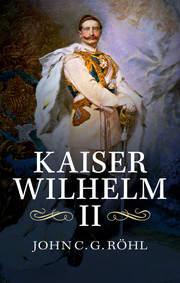Book contents
- Frontmatter
- Dedication
- Contents
- List of figures
- Acknowledgements
- Preface to the English edition
- Preface to the German edition
- Acknowledgements
- Overview: Wilhelm the Last, a German trauma
- Part I 1859–1888: The Tormented Prussian Prince
- Part II 1888–1909: The Anachronistic Autocrat
- Part III 1896–1908: The Egregious Expansionist
- Part IV 1906–1909: The Scandal-Ridden Sovereign
- Part V 1908–1914: The Bellicose Supreme War Lord
- 17 The Bosnian annexation crisis (1908–1909)
- 18 The ‘leap of the Panther’ to Agadir (1911)
- 19 The battlefleet and the growing risk of war with Britain (1911–1912)
- 20 Doomed to failure: the Haldane Mission (1912)
- 21 Turmoil in the Balkans and a first decision for war (November 1912)
- 22 War postponed: the ‘war council’ of 8 December 1912
- 23 The postponed war draws nearer (1913–1914)
- 24 The Kaiser in the July crisis of 1914
- Part VI 1914–1918: The Champion of God’s Germanic Cause
- Part VII 1918–1941: The Vengeful Exile
- Notes
- Index
21 - Turmoil in the Balkans and a first decision for war (November 1912)
Published online by Cambridge University Press: 05 September 2014
- Frontmatter
- Dedication
- Contents
- List of figures
- Acknowledgements
- Preface to the English edition
- Preface to the German edition
- Acknowledgements
- Overview: Wilhelm the Last, a German trauma
- Part I 1859–1888: The Tormented Prussian Prince
- Part II 1888–1909: The Anachronistic Autocrat
- Part III 1896–1908: The Egregious Expansionist
- Part IV 1906–1909: The Scandal-Ridden Sovereign
- Part V 1908–1914: The Bellicose Supreme War Lord
- 17 The Bosnian annexation crisis (1908–1909)
- 18 The ‘leap of the Panther’ to Agadir (1911)
- 19 The battlefleet and the growing risk of war with Britain (1911–1912)
- 20 Doomed to failure: the Haldane Mission (1912)
- 21 Turmoil in the Balkans and a first decision for war (November 1912)
- 22 War postponed: the ‘war council’ of 8 December 1912
- 23 The postponed war draws nearer (1913–1914)
- 24 The Kaiser in the July crisis of 1914
- Part VI 1914–1918: The Champion of God’s Germanic Cause
- Part VII 1918–1941: The Vengeful Exile
- Notes
- Index
Summary
The focus of trouble in Europe was in any case shifting from west to east as a result of the rapid decline of the Ottoman Empire. The Young Turk revolution of 1908, the Bosnian annexation crisis of 1908–9, the removal of Sultan Abdulhamid II in 1909 and the Italian attack on Tripoli (Libya) in 1911 had aroused hopes of territorial expansion among the smaller Balkan states. In late September 1912 the First Balkan War broke out when Montenegro, Serbia, Bulgaria and Greece attacked Turkey. Kaiser Wilhelm II welcomed the Balkan countries’ advance, and in his characteristic style mocked the diplomats trying to restore peace as ‘eunuchs’. He declared scornfully that ‘civilians’ could not judge the situation, as ‘that is a matter for the military’. On 4 October 1912 he ominously exclaimed: ‘The Eastern Question must be resolved by blood and iron! But at a time that suits us! That is now.’
It was the Kaiser’s dream that the four Christian states in the Balkans would combine in a ‘4-Power League’, which would then be taken into the ‘European Concert’ as ‘a 7th Great Power’, and would in fact be ‘aligned with Austria and the Triple Alliance!’. Austria, he demanded, had to
give the construction of a ‘United States of the Balkans’…her energetic support. For in such a formation the Balkan states will soon get themselves into opposition to Russia, and will then quite naturally have need of Austria and hence of the Triple Alliance, for which they will provide a very desirable reinforcement and an offensive flank against Russia.
- Type
- Chapter
- Information
- Kaiser Wilhelm IIA Concise Life, pp. 135 - 138Publisher: Cambridge University PressPrint publication year: 2014



